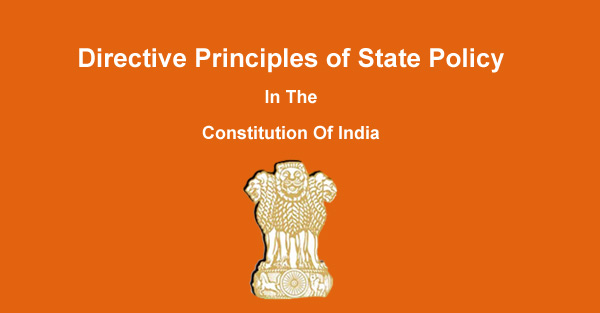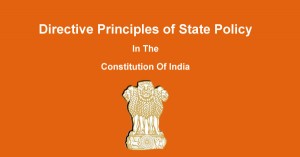In this blog post, Pramit Bhattacharya, a student of Damodaram Sanjivayya National Law University writes about the scope of enforcement of Directive Principles of State Policies (DPSP) and looks into the relation between DPSPs and Fundamental Rights. The post further talks about the legislative intent of the framers of the Constitution regarding the issue of enforcement of DPSPs.
There is no denying the fact that the responsibility of the development of the country lies with the government. And with the aim of development in view, the government forms certain policies. The Directive Principles of State Policy (DPSPs) act as the guiding steps for the government to forms the policies. The belief that the rulers and masters are responsible for the welfare of the society has been prevalent in India for a long time. The formation of the Constituent Assembly also took place amid such an environment. Article 36 to Article 51 which are enshrined in Part IV of the Constitution form the core of the DPSPs.[1] These Articles are to be taken into consideration by the government and the legislature when they carry out the legislative work. But the DPSPs are not enforceable, quite unlike the Fundamental Rights which are enshrined in Part III of the Constitution.
The DPSPs not only act as the guiding principles in making policy decisions, but they also lay down the objectives of India as a nation. The presence of the DPSPs makes India a welfare state.[2] The DPSPs encourages the government and the legislature to promote the welfare of the citizens and the society. Apart from this the DPSPs also seeks to ensure that there is economic and social democracy in our nation, as has been promised by the Preamble.[3] The main aim of the DPSP is to maintain a socialistic pattern in the society. The thing that is to be noted here is that the Constitution does not support any extremities like total socialism or total individualism.
The Nature of the DPSPs is explained by Article 37 of the Constitution. Article 37 states that the provisions given under Part IV of the Constitution cannot be enforced in the Court of law, but it is the duty of the government of the nation to consider these principles in the governance of the country because these articles are fundamental in ensuring good governance of the country. Non-enforceability of these articles in the Court does not make them useless. These principles have an educative value and also help the nation to maintain its “welfare state” status. These principles also help the Judiciary to interpret different statutes and also the Fundamental Rights which has been guaranteed by the Constitution. In the judicial pronouncement of Air India Statutory Corporation v United Labor Union,[4] the Apex Court opined that the DPSPs are the harbingers of the Right to Development. The Court considered the Principles as an integral part of the Constitution and stated that they are absolute to the fundamental human rights.
Relation of DPSPs with Fundamental Rights
When talking about DPSPs, the main question which arises is that how compatible are they with the Fundamental rights which are enforceable in the Court of law through different kind of writs. There are several differences between the DPSPs and the Fundamental Rights-
- On one hand where the DPSs act as the guiding principles in the formation of policies, on the other hand, the Fundamental Rights can be said to be a limitation of the powers of the Government. There are several Rights which has been guaranteed by the Constitution, which cannot be revoked even by the State.
- The principle stated under Article 36 to Article 51 cannot be violated by the State or any individual since they are not enforceable. But if any Fundamental Right is being violated, a person can go to the Court of law to seek a remedy.
- Any law which is in conflict with the Fundamental Rights can be declared void or unconstitutional by the Courts, but this is not the case with DPSPs.
When the question of priority arises between DPSPs and Fundamental Rights, there are several conflict over the issue. The judicial decisions have also been varying over the years. In the case of State of Madras v. Champakan Dorairajan,[5] the Apex Court stated that if any law is in violation of the Fundamental Rights, such law will be considered unconstitutional, but this stand will not be taken if any valid law contravenes the DPSPs. Thus, it can be said that Fundamental Rights were given more priority over the DPSPs. But this proposition was changed with the help of Constitutional (42nd Amendment) Act, 1976. The scope of Article 31C was broadened which stated that if any law is made to implement the DPSPs, it’ll not be held unconstitutional on the grounds that it violated Article 14 and Article 19. But again in the landmark judicial pronouncement of Minerva Mills v Union of India,[6] the broadening of the scope of Article 31C was struck down by the Court. The Court was of the opinion that the balance Fundamental Rights and the DPSPs have to be maintained as they are complimentary to each other, and the legislature should look into the harmonious construction of the two.
Framers of the Constitution and their views[7]
The enforceability of DPSPs is a very debatable topic. H. M. Seervai stated that if the Fundamental Rights were ever struck down by the Courts, the effects would be catastrophic. But this wouldn’t be the case if DPSPs were struck down.[8] Nevertheless, these Principles found their support within the Constituent Assembly with many notable figures like B. N. Rau, K. T. Shah, and B. R. Ambedkar defending the inclusion of the Directive Principles in the Constitution. B. N Rau believed that these principles, for the purpose of greater good, can occasionally invade individual rights. K.T. Shah and B. R. Ambedkar were also great supporters of the DPSPs and the looked at the principles from a Socialistic view.[9] The question which arises at this point is that when the Constituent Assembly, in a general sense supported the inclusion of DPSPs, why were they not made enforceable, and only included as guiding principle?
There are two reasons which can be stated as regards to this question. First of all, the Assembly feared that these Principles could become outdated with the change in time. Secondly, at the time of Independence and adoption of the Constitution, India did not have a lot of resources so as to make all the DPSPs enforceable. It was left to the government to follow then voluntarily.[10]
Enforcement of DPSPs?
Why the DPSPs were not made enforceable by the Constituent Assembly has been mentioned above. But non-enforceability of the Principles does not mean that they are of no use. Arguments have been given both in favor and against of making the DPSPs enforceable. Those who favor the enforcement of the Principles argue that enforceability of DPSPs will keep in check the autocratic tendencies of a government. The enforcement of the Principles can also help to unite India. For instance, Article 44 of the Constitution talks about a Uniform Civil Code. The Uniform Civil Code aims for uniform provisions of civil law for all the citizens of the country irrespective of their caste, religion or beliefs, much like the criminal law.
Those who are against the enforcement of the DPSPs say that the Principles need not be separately enforced as there are many policies and laws which already implement these principles indirectly. For instance, Article 40 of the Constitution which talks about Panchayati Raj was introduced through a constitutional amendment, and it is very evident that there are numerous panchayats in the country today. Article 47 speaks about raising the standard of living of the people in the society. For that too, various policies are in place. Similarly, there are other Articles also like Article 39(a) which speaks about providing adequate means of livelihood to the people, and Article 39(g) which states that government shall endeavor to prevent exploitation of children, for which the government has already introduced different policies. Another argument which has been given against the enforcement of the DPSPs is that it try to impose moral values on the citizens. It is important to understand that law and morals are separate things, and imposing morals on the citizens is not within the scope of the law. Too much moral values can sometimes impede the growth of society.
Concluding Remarks
There is still no clear cut answer as to whether the DPSPs should be made enforceable or not. Keeping in mind the position of the Principles, even without enforcement in the Court of law, it can be said that they are not useless. Making them enforceable will make the system too rigid, as certain Principle may change over time. They do keep a check on the anarchist ways of a government indirectly, not through Courts but through the citizens of the nation. The Principles stated in the Constitution often act as a yardstick to measure the effectiveness of a government. Also, these DPSPs are implemented through various other legislations and policies. If they are made enforceable, it may lead to abuse of these Principles. The Courts also supports the proposition that there should be a balance and harmonious construction between the DPSPs and the Fundamental Rights, which can be done even without enforcing the DPSPs.
Footnotes:
[1]http://indiacode.nic.in/coiweb/coifiles/p04.htm
[2]http://www.legalservicesindia.com/article/article/concept-of-welfare-state-and-its-relevance-in-indian-scenario-507-1.html
[3]http://lawmin.nic.in/olwing/coi/coi-english/Const.Pock%202Pg.Rom8Fsss(3).pdf
[4]AIR 1997 SC 645
[5](1951) SCR 523 (531)
[6]AIR 1980 SC 1789
[7]http://www.lawctopus.com/academike/scope-of-enforcement-of-dpsps/
[8] Constitutional Law of India (Volume 2), 1921
[9] Granville Austin, The Indian Constitution: Cornerstone of a Nation
[10]http://logos.nationalinterest.in/2014/07/constituent-assembly-debate-on-directive-principles-of-state-policy/
 Serato DJ Crack 2025Serato DJ PRO Crack
Serato DJ Crack 2025Serato DJ PRO Crack












 Allow notifications
Allow notifications


